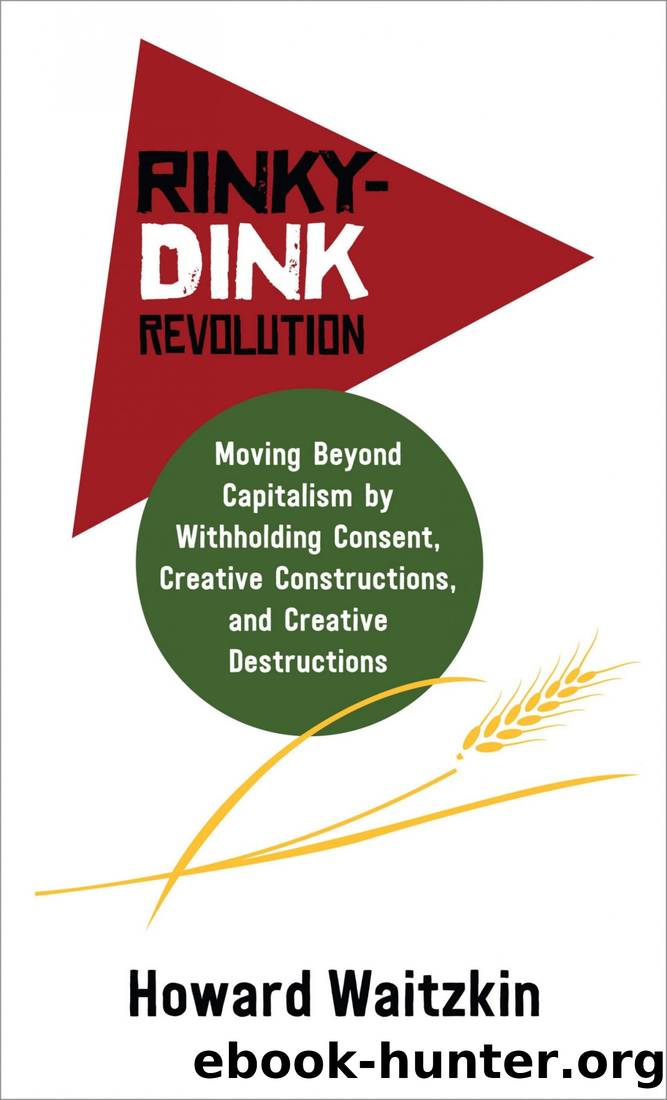Rinky-Dink Revolution: Moving Beyond Capitalism by Withholding Consent, Creative Constructions, and Creative Destructions by Howard Waitzkin & Tbd

Author:Howard Waitzkin & Tbd [Waitzkin, Howard & Tbd]
Language: eng
Format: epub
Tags: Philosophy, Communism; Post-Communism & Socialism, Capitalism, Political Ideologies, Movements, Political Science, Humanism
ISBN: 9781988832531
Google: JWgwzQEACAAJ
Publisher: Daraja Press
Published: 2020-03-14T13:30:49+00:00
*
Secondly, the path to a solidarity economy includes solving the food problem. The goal is sustainable, local food production and consumption with a low carbon footprint (meaning minimal petroleum products used for fertilizers, pesticides, and transportation of food and its raw materials) and with a more favorable impact on the health of human beings, other living species, and the earth. Community gardens and food coops figure as key components of achieving food security, a critical goal for obvious reasons. Gardening principles include cultivating plants that produce healthy nutrients such as non-animal sources of proteins, with limited sugar and fat. These principles recognize the worldwide epidemics of obesity and diabetes, which reflect a combination of food insecurity, âfood desertsâ where healthy foods are unavailable or too expensive for purchase in many inner-city and rural areas, and over-promotion of sugar- and fat-rich foods by capitalist agricultural and food industries that manufacture and market processed foods. Animals providing meat, fish, eggs, and milk products for human beings who opt for continuing non-vegetarian or non-vegan diets are locally raised, slaughtered, and packaged for local consumption. A key objective is independence from capitalist agriculture. Food independence means giving up consumption of food that requires access to seasonal production in distant places with carbon-based transportation over long distances, whose high costs and pollution contribute to the climate crisis, depletion of fresh water, and continuing exploitation of agricultural workers. For families of average size, the aim again is $150 per month of food costs, which can be in currency or time equivalents.[5]
Other key elements of living well in the solidarity economy involve stopping economic activities that are ecologically unsustainable.[6] Capitalismâs inherent need for growth requires endless expropriation of natural resources and pollution of the planet. Thus, constructing the solidarity economy outside capitalism fosters de-growth, which means stopping the vicious cycle of overproduction and overconsumption that inherently damage the earth and its beings. Economic growth requires consent at the level of desire. Ideology, as already discussed, fosters desire for unneeded consumer goods and services, and manipulated desire fuels the demand leading to unnecessary overproduction. Breaking this vicious cycle of growth involves stopping our consent to it, requiring shifts in the desires that capitalist markets have generated.
Transportation provides a clear example of withholding consent to unsustainable economic activities. As one of many examples, each roundtrip transcontinental airplane flight generates a carbon footprint that leads to the melting of about three cubic meters of arctic ice.[7] So going beyond capitalism, among other activities that produce carbon dioxide, requires not seeing so much of the world so much of the time. Similar undramatic choices involve the vehicles we choose to use every day. Simple changes in economic consumption, of course, will not save the planet without other revolutionary actions that withhold consent to capitalismâs ways of doing business, some of which appear below in the section on creative destructions.
Will we need money in post-capitalism? Day-to-day life in the solidarity economy means engaging in cooperative economic activities to meet oneâs own needs and wants, as well as meeting the needs and wants of others in oneâs community.
Download
This site does not store any files on its server. We only index and link to content provided by other sites. Please contact the content providers to delete copyright contents if any and email us, we'll remove relevant links or contents immediately.
| Deconstruction | Existentialism |
| Humanism | Phenomenology |
| Pragmatism | Rationalism |
| Structuralism | Transcendentalism |
| Utilitarianism |
The remains of the day by Kazuo Ishiguro(8975)
Tools of Titans by Timothy Ferriss(8365)
Giovanni's Room by James Baldwin(7326)
The Black Swan by Nassim Nicholas Taleb(7107)
Inner Engineering: A Yogi's Guide to Joy by Sadhguru(6785)
The Way of Zen by Alan W. Watts(6601)
Asking the Right Questions: A Guide to Critical Thinking by M. Neil Browne & Stuart M. Keeley(5759)
The Power of Now: A Guide to Spiritual Enlightenment by Eckhart Tolle(5752)
The Six Wives Of Henry VIII (WOMEN IN HISTORY) by Fraser Antonia(5497)
Astrophysics for People in a Hurry by Neil DeGrasse Tyson(5182)
Housekeeping by Marilynne Robinson(4436)
12 Rules for Life by Jordan B. Peterson(4299)
Double Down (Diary of a Wimpy Kid Book 11) by Jeff Kinney(4261)
Ikigai by Héctor García & Francesc Miralles(4246)
The Ethical Slut by Janet W. Hardy(4242)
Skin in the Game by Nassim Nicholas Taleb(4239)
The Art of Happiness by The Dalai Lama(4125)
Skin in the Game: Hidden Asymmetries in Daily Life by Nassim Nicholas Taleb(3989)
Walking by Henry David Thoreau(3953)
